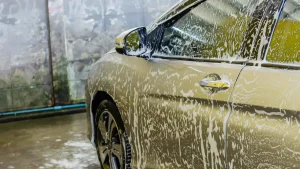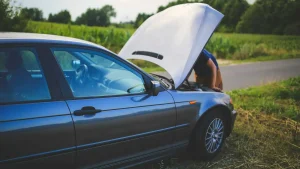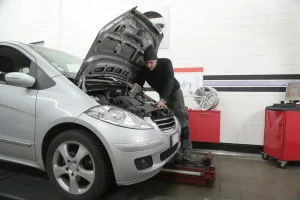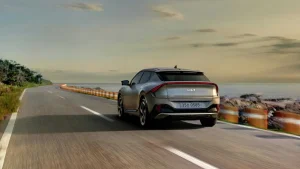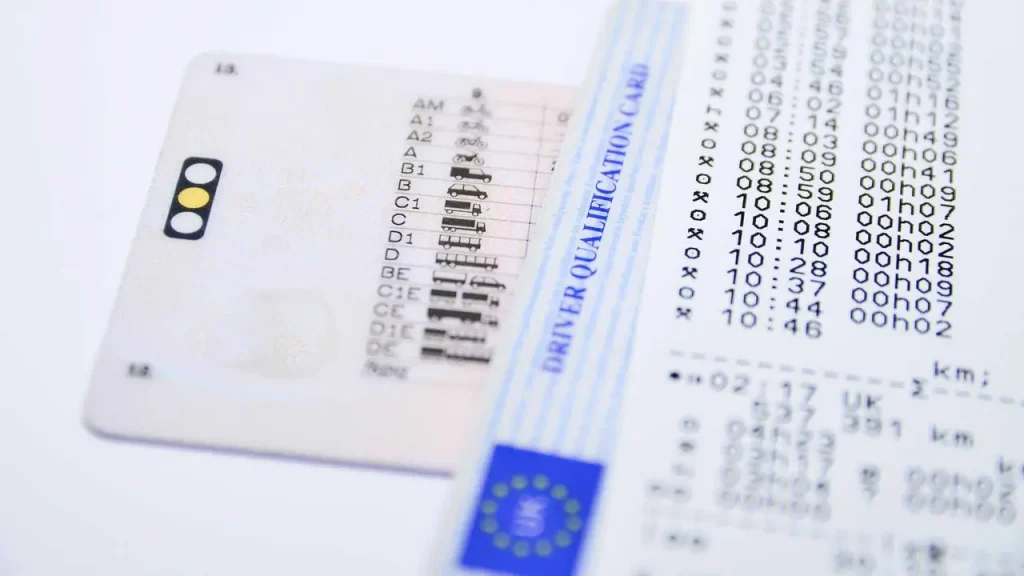
Your Guide to Essential Car Ownership Documents
I once spent a frantic Tuesday morning tearing my house apart, convinced I’d lost the V5C logbook for my car just days before I was due to sell it. The panic was real. Drawers were emptied, old files were thrown across the floor, and I was on the verge of a full-blown meltdown. It turns out, of course, it was exactly where I’d left it, just in a ‘safe place’ so clever I’d outsmarted myself.
This little episode taught me a valuable lesson about the sheer stress that comes with misplacing your paperwork. These aren’t just bits of paper; they are the absolute proof of your right to own and operate your vehicle. Getting your head around the full suite of essential car ownership documents is the first step to avoiding that kind of panic.
Understanding Essential Car Ownership Documents
Let’s be honest, dealing with paperwork is a universal chore nobody enjoys. But when it comes to your car, it’s a non-negotiable part of responsible ownership. These documents are your legal lifeline, proving you own the car, are insured to drive it, and have met the government’s standards for roadworthiness.
Think of them as your car’s passport and CV rolled into one. Without the right collection of vehicle paperwork, you can find yourself in serious trouble, facing fines or even having your vehicle seized. It’s a headache you just don’t need.
Why Keeping Your Car Paperwork Organized Matters
Disorganization is expensive and stressful. Imagine being pulled over and not being able to produce your insurance details, or trying to sell your car and discovering a crucial document is missing. Total chaos. Keeping your paperwork in order means you can handle any situation—a random police check, an accident, a sudden decision to sell—with calm and efficiency.
A well-organized folder, either physical or digital, saves you time, money, and a whole lot of anxiety. It’s also incredibly satisfying to know exactly where everything is when you need it. This peace of mind is one of the main benefits of having your vehicle’s records properly filed.
Core Documents for Legally Driving Your Vehicle
Before you even turn the key, there are a few non-negotiables you must have sorted. These are the absolute fundamentals, the bedrock of legal driving in the UK. Missing any of these can lead to immediate and serious consequences. So, what documents do I need to own a car and drive it legally? Let’s break down the big three.
The Vital Role of Your Vehicle Registration Certificate (V5C Logbook)
The V5C, or logbook as it’s commonly known, is the undisputed champion of car paperwork. It’s one of the most critical proof of car ownership documents you will hold. This document, issued by the DVLA, officially registers you as the vehicle’s keeper. It contains all the key details: the registration mark, the date of first registration, the chassis number (VIN), and your name and address.
You need it to tax your vehicle, to change your address, and, crucially, to transfer ownership when you sell it. Losing it is a massive pain, but don’t despair; knowing how to replace lost V5C logbook is a straightforward, if slightly tedious, process involving an application to the DVLA. It is one of the key documents you guard with your life.
Your Driving Licence: The Gateway to the Road
This one seems obvious, but it’s the absolute foundation. Your driving licence is your personal permit to be on the road. It proves you have passed the required tests and are legally allowed to operate a vehicle of a certain class. Always ensure it’s valid, up to date with your current address, and that the photo is a reasonable likeness. An out-of-date licence can invalidate your insurance, a catastrophic mistake in the event of an accident.
MOT Certificate and Road Tax: Staying Compliant
In the UK, any car over three years old needs an annual MOT test to ensure it meets minimum safety and environmental standards. The MOT certificate is your proof of passing. While most records are now digital, keeping a copy is wise. If you ever need one, learning how to get a duplicate MOT certificate is easy through the government website.
Alongside the MOT is your road tax (Vehicle Excise Duty – VED). You must tax your vehicle to use it or even park it on a public road. The days of the paper disc are long gone; it’s all handled online now, but you must ensure it’s always current. Non-compliance leads to automatic fines. Keeping these updated is a core part of managing your vehicle’s paperwork.
Financial and Insurance Documentation for Car Owners
Beyond the legal right to drive, you need to prove you’re financially covered. This means having your insurance and purchase documents in order. This isn’t just about protecting your investment; it’s a legal requirement and a safety net for life’s unexpected turns.
Decoding Your Car Insurance Policy Documents
Car insurance is mandatory. You cannot legally drive without at least third-party coverage. Your insurer will provide you with a policy schedule and a certificate of motor insurance. The certificate is the key legal document. While you don’t have to carry it with you anymore, you must be able to produce it if required.
Understanding the fine print is crucial, so a good car insurance document checklist should include the policy booklet which details your cover level, excess amount, and any exclusions. Taking time for explaining car insurance policy documents to yourself can save you from nasty surprises later.
Proof of Purchase and Finance Agreements
When you buy a car, you’ll receive a receipt or a bill of sale. This is your initial proof of purchase and a vital document, especially for private sales. If you’ve bought the car on finance, you’ll have a whole other stack of papers. The finance agreement is a legally binding contract detailing your repayment schedule, interest rates, and the terms of the loan.
It’s dense, but you must read it. The process of having car finance agreement documents explained can feel overwhelming, but it’s essential for your financial health. Understanding these terms can help you recognize and avoid financial fraud, ensuring you’re not signing up for something with hidden costs or predatory clauses. These are some of the most important records for your financial security.
What Paperwork is Needed After an Accident?
Nobody wants to think about it, but accidents happen. In the immediate aftermath, the most important things are safety and exchanging details. You’ll need to provide your name, address, and insurance details to the other party. Having a photo of your insurance certificate on your phone can be a lifesaver. You’ll then need your policy number to contact your insurer and begin the claims process. This is when you’ll be glad you have your paperwork organized and accessible.
Maintaining Your Vehicle: Service and Warranty Records
Your car’s history is written in its paperwork. These documents tell the story of how well it’s been looked after, which directly impacts its performance, safety, and, ultimately, its resale value. The maintenance file is one of the most crucial records for preserving value.
The Value of a Comprehensive Service History
A car with a full service history is worth significantly more than one without. But what is a car service history book? It’s a log, traditionally a stamped booklet, that details all the routine maintenance and servicing the vehicle has had.
It shows prospective buyers that the car has been cared for properly. A complete record proves you’ve followed recommended schedules, and consistent upkeep is one of the best car maintenance tips for longevity. It’s the difference between an easy sale and a buyer walking away.
Understanding Car Warranty Documents
If you buy a new or nearly new car, it will likely come with a manufacturer’s warranty. This document outlines what parts are covered and for how long. It’s important to read this to understand your obligations, as failing to service the car at an approved garage can void the warranty. For older cars, you might purchase an aftermarket warranty. Again, read the fine print—they vary wildly in quality and coverage.
Receipts for Repairs and Upgrades
Keep every single receipt for work done on your car. New tyres? Keep the receipt. Exhaust replaced? Keep it. These papers build a detailed picture of the car’s life and reinforce the service history. They are tangible proof of investment and care, showing that you’ve not cut corners.
Documents Required When Buying or Selling a Car
The transfer of a car from one person to another is a process governed by paperwork. Getting it right ensures a smooth transaction for both parties and keeps everything above board with the DVLA. Managing your vehicle’s paperwork is never more important than at this moment.
Essential Paperwork for a Smooth Car Purchase
So, what paperwork do I need to buy a car privately? You need to see the seller’s V5C logbook and ensure the details match the car and the person selling it. Check the VIN on the car against the V5C. You’ll fill in the relevant section of the V5C with your details, and the seller sends it to the DVLA. You should also get a written receipt, the MOT certificate, and the service history book. These are non-negotiable proof of car ownership documents.
Preparing Your Documents for Selling Your Vehicle
To sell your car, you need to have all your ducks in a row. A complete set of documents inspires confidence. The list of documents needed to sell a used car UK includes the V5C, a current MOT certificate, the full service history, and any receipts for work done.
You are legally responsible for telling the DVLA you’ve sold the vehicle by completing and sending off the relevant section of the V5C. Fail to do this, and you could be liable for the new owner’s speeding tickets. What a nightmare.
Best Practices for Organizing and Storing Car Documents
Knowing what papers you need is only half the battle. You also need a system to keep them safe and accessible. Figuring out the best way to organize vehicle paperwork will save you from future panic.
Physical vs. Digital Storage Solutions
A simple physical folder or binder works perfectly well. Labelled dividers for ‘V5C’, ‘Insurance’, ‘MOT’, and ‘Service History’ can work wonders. However, we live in a digital age. Scanning all your documents and saving them to a secure cloud service is a brilliant backup. It means you can access them from anywhere, on any device. The best solution? Do both.
Creating an Emergency Car Document Kit
A common question is which car documents should be kept in car. The answer is, surprisingly, very few. Never, ever leave your V5C logbook in the car. If the car is stolen, you’ve just given the thief a key document to sell it on. Most experts advise against leaving anything with your home address on it inside the vehicle.
Instead, keep photos on your phone or have copies accessible via the cloud. The exception might be for longer trips, but even then, be careful. This differs greatly from the documentation you need for short-term driving solutions, as outlined in this helpful UK car rental and car sharing guide, where you typically carry the agreement with you.
Frequently Asked Questions About Car Paperwork
The world of vehicle admin can be confusing. Here are some quick answers to common queries about car paperwork.
What should be on a basic car ownership documents checklist UK?
At a minimum, your checklist should include: the V5C Registration Certificate, a valid MOT certificate (if applicable), your Certificate of Motor Insurance, and the car’s service history book.
What are the legal requirements for car documents in the UK?
You are legally required to have a valid driving licence, current road tax (VED), and at least third-party motor insurance. Your vehicle must also have a valid MOT certificate if it’s over three years old. These are the core legal requirements for car documents.
So, what documents do I need to own a car, really?
To own it, the V5C is the primary document linking you as the keeper. To use it on the road, you need the licence, tax, MOT, and insurance. They all work together as your essential car ownership documents.
Final Thoughts: Drive with Confidence and Clarity
Managing your car’s paperwork doesn’t have to be a source of stress. By understanding what each document is for and creating a simple system to organize them, you can take control. You can handle anything from a routine sale to an unexpected accident with confidence. It’s about more than just satisfying bureaucracy; it’s about protecting your investment, ensuring your safety, and enjoying the freedom of the open road with complete peace of mind, knowing all your documents are in perfect order.


